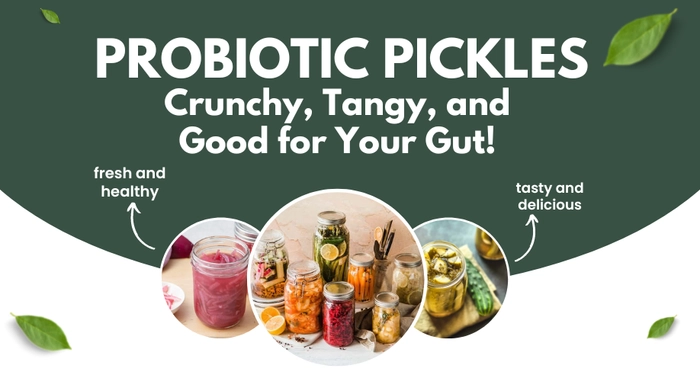Boost Your Gut Health with Homemade Probiotic Pickles
In recent years, the importance of gut health has garnered significant attention in both scientific circles and popular culture. Probiotic foods, rich in beneficial bacteria, play a crucial role in maintaining a healthy gut, which in turn affects various aspects of our physiology, including digestion, immune function, and even mood regulation. The gut-brain axis, a complex communication network linking our gut and brain, underscores how a healthy gut can positively influence our mental health.
SYNOPSIS
This blog post delves into the benefits of probiotic foods for gut health, exploring their positive impact on digestion, immunity, and mood. It includes a simple recipe for homemade probiotic pickles and introduces Takrarishta, an Ayurvedic fermented buttermilk formulation, emphasizing their roles in promoting overall well-being.
The Importance of Probiotic Foods
Probiotic foods are essential for maintaining a balanced gut microbiome. This balance is crucial for:
- Digestive Health: Probiotics help break down food, absorb nutrients, and prevent gastrointestinal issues such as bloating, constipation, and diarrhea.
- Immune System: A healthy gut microbiome strengthens the immune system, helping to ward off infections and illnesses.
- Mental Health: The gut produces neurotransmitters like serotonin, which regulate mood and cognitive function. A balanced gut can help reduce symptoms of anxiety and depression.
Ayurvedic Perspective on Probiotics
Ayurveda, the ancient Indian system of medicine, emphasizes the importance of maintaining a balance in the body's doshas (vata, pitta, and kapha) for overall health. Probiotic foods, known as "fermented foods" in Ayurveda, are considered sattvic (pure) and are believed to enhance the digestive fire (agni), improve digestion, and detoxify the body. Ayurvedic texts recommend incorporating naturally fermented foods like pickles, yogurt, and buttermilk into daily diets to promote health and longevity.
Homemade Probiotic Pickles: A Simple Recipe
Making your own probiotic pickles at home is not only easy but also free of preservatives and chemicals. Here's a detailed recipe to get you started:
Ingredients:
- Fresh vegetables (onions, carrots, cauliflower, etc.)
- Water (enough to completely immerse the vegetables)
- Salt (2.5% of the total weight of water and vegetables combined)
Instructions:
1. Prepare the Vegetables:
- Wash and chop the vegetables into desired sizes.
- Ensure all vegetables are fresh and free from any signs of spoilage.
2. Prepare the Brine:
- Measure the total weight of the vegetables and water.
- Add salt equivalent to 2.5% of this total weight. For example, if the combined weight is 1 kg, add 25 grams of salt.
- Stir until the salt is fully dissolved.
3. Fermentation Process:
- Place the vegetables in a clean jar and pour the brine over them, ensuring they are fully submerged.
- Cover the jar loosely with a cloth to allow gases to escape during fermentation.
- Leave the jar in a sunny spot for a couple of days. The duration depends on the temperature and desired tanginess. Taste periodically until the pickles reach your preferred flavor.
4. Storage:
- Once fermented to your liking, seal the jar tightly and refrigerate for a few days to enhance the flavors further.
5. Enjoy Your Probiotic Pickles:
- Your homemade pickles are ready to be enjoyed. Use the leftover brine as a probiotic-rich addition to soups, stews, or even as a seasoning in salads.
Other Natural Probiotic Foods
In addition to homemade pickles, consider incorporating these natural probiotic foods into your diet:
- Lassi: A traditional Indian yogurt-based drink, lassi is both refreshing and beneficial for gut health.
- Buttermilk: Known as "chaas" in India, buttermilk is another excellent probiotic drink that aids digestion.
- Yogurt: A well-known source of probiotics, yogurt can be enjoyed on its own or added to smoothies and dishes.
- Kombucha: A fermented tea beverage that offers a variety of probiotics and a tangy taste.
- Kimchi: A spicy Korean fermented cabbage dish that is rich in probiotics and vitamins.
- Takrarishta: Takrarishta is a traditional Ayurvedic formulation known for its digestive and carminative properties. It is an herbal fermented preparation primarily made from buttermilk (takra) and various medicinal herbs. Takrarishta is often used to treat digestive disorders, enhance appetite, and improve overall gut health.
The Health Benefits of Fermented Foods
Fermented foods, including the ones mentioned above, offer numerous health benefits:
- Improved Digestion: They help break down food and absorb nutrients more efficiently.
- Enhanced Immunity: Regular consumption can boost your immune system and protect against common illnesses.
- Mental Well-being: Fermented foods can contribute to better mood regulation and cognitive function due to the gut-brain connection.
Incorporating probiotic foods into your daily diet can lead to significant improvements in your overall health. Start with this simple pickle recipe and explore other fermented foods to enjoy the myriad benefits they offer. Your gut—and your whole body—will thank you!

